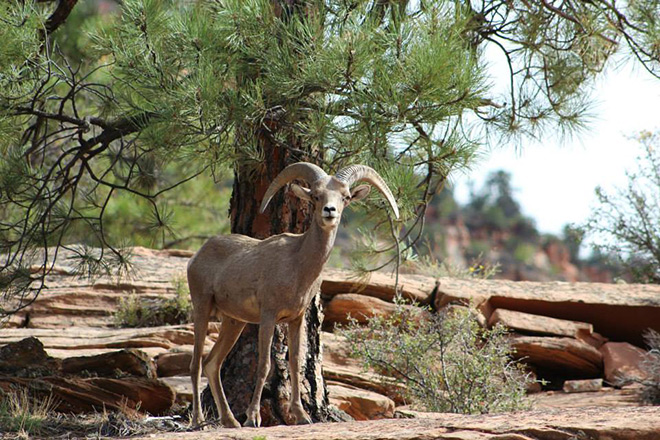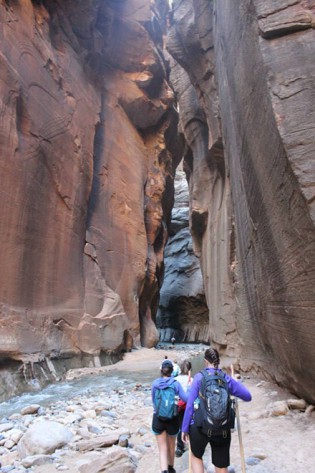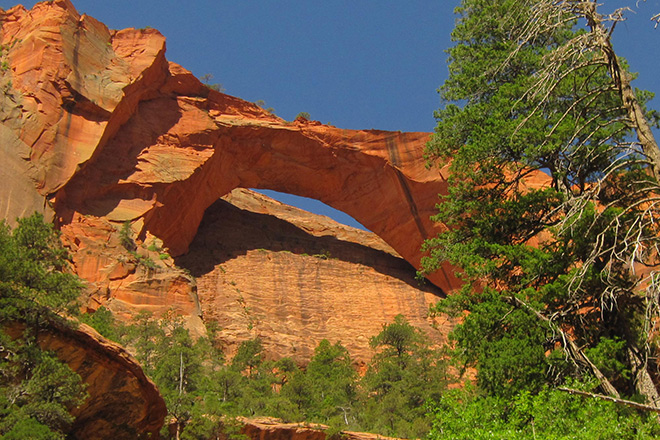One of the most widely visited national parks in the Southwest, Zion is famous for its colorful sandstone rock formations with high cliffs and narrow canyons carved into shape by the power of the Virgin River.
What many visitors may not know is that Zion’s diverse habitats allow for a wealth of plants and wildlife to thrive among those towering rocks, including 900 species of plants, 67 species of mammals, 29 species of reptiles, and more than two hundred types of birds. Among the wildlife, you can spot bighorn sheep along the cliff sides, lizards scattering across the hot sandstone, and rock squirrels playing along canyon walls.
The list of things to do at Zion is as diverse and fascinating as the plants, animals, canyons, and mesas you can find here. Whether you want to stroll along the river or scale a 1,500-foot cliff, there is something for everyone.
Things to do
- Take stock at the visitor center. Always make the visitor center your first stop on any national park visit. Here you can speak with park rangers about personalized recommendations and weather conditions, and learn a little more about the park than you might get along the trail.
- Familiarize yourself with the park’s free shuttle system. From the beginning of April to the end of October, most visitors must use the Zion Canyon Shuttle to get to trailheads and services in Zion Canyon (the main tourist area within the park). The rest of the year, Zion Canyon Scenic Drive is open to private vehicles—though the shuttle remains available on a less-frequent schedule during the off-season.
- See the Emerald Pools. Take a hike to Lower Emerald Pool. This one-mile hike is on a paved trail with a slight incline to the lower pool where you can see a waterfall from the Upper Emerald Pool. If you are feeling up for it, you can keep hiking to the Upper Pool for a beautiful view of the valley.
- Hike the Narrows. One of the most popular areas in the park, the Narrows is literally the narrowest part of Zion Canyon. Visitors can explore the area by wading into the river at Temple of Sinawava and following it for as long or as short of a hike as they wish. Canyon walls are as high as a thousand feet with some parts of the river measuring only 30 feet wide. I highly recommend renting water shoes and hiking sticks from local outfitters and leaving early to beat the crowds. Don’t want to hike in the river? You can still enjoy the one-mile Riverside Walk leading to the start of the Narrows; the paved trail has great spots to see and picnic along the Virgin River.
- Consider Angels Landing. This adventure is not for the faint of heart, but the five-mile round-trip is one of the most exhilarating hikes I have taken. The first two miles are a paved all-uphill climb to Scout Lookout. From the lookout, you traverse the last half-mile climb to Angels Landing along sheer fins with anchored support chains. The rewards for this dizzying and strenuous hike? One of the best views of Zion Canyon. This was my favorite hike in all of my travels around the Southwest. Check weather conditions before attempting this trail and be sure to get there early to beat the crowds.
- Explore Kolob Canyons. Forty miles northwest of the main tourist area at Zion National Park, visitors can experience a less-crowded, more remote section of the park. Take a five-mile scenic drive along Kolob Canyons Road where you can see amazing red rock formations. If you are a fit and experienced hiker, you can take a 14-mile hike to see the Kolob Arch, one of the largest free-standing arches in the world. A couple of shorter hikes are also available to explore this beautiful wilderness area.
Zion National Park offers an abundance of things to do. This list only scrapes the surface. As you plan your trip, be sure to leave room in your schedule to find new adventures.
This story is part of NPCA’s biweekly Desert Getaway series. Read more stories in the series for tips on visiting other desert parks.
About the author
-
 Megan Cantrell Former Social Media Manager
Megan Cantrell Former Social Media ManagerMegan Cantrell worked at National Parks Conservation Association for 10 years, much of that time shepherding NPCA’s social media program.


